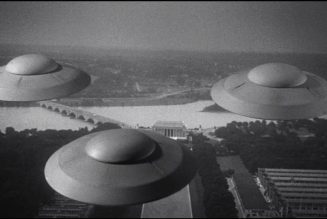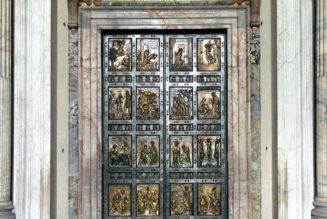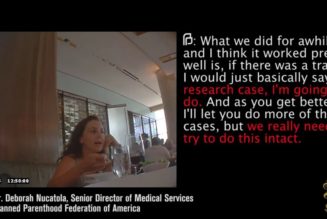
The two common misunderstandings both have the same source: trying to figure out the word excommunication based on its word origins instead of its current usage.
People have the idea that ex- means things like “former” (an ex-wife as opposed to a current wife), “out” (to export rather than to import), or “deprive” (to expropriate rather than appropriate).
Communion is understood in terms of either receiving the Eucharist (sacramental communion) or being part of the Church (ecclesiastical communion).
To excommunicate would thus mean to deprive someone of the Eucharist or kick him out of the Church.
Or so you’d think. The actual way to figure out what excommunication is and does is by looking at canon law, and this has changed dramatically over the centuries.
For much of the twentieth century, canon law was embodied in the 1917 Code of Canon Law (CIC), but that was replaced by a new code in 1983. This year (2021), Pope Francis replaced Book VI of the Code, which deals with penalties, including excommunication.
So what is excommunication? In the first place, it’s a penalty, which is why it’s dealt with in Book VI of the Code (“Penal Sanctions in the Church”).
People often think of penalties as punishments intended to satisfy justice by inflicting pain on someone who deserves it. But there is more than one kind of penalty, and excommunication is what’s known as a censure.
Censures are mainly medicinal; they are meant to wake up a person to his wrongdoing so he can repent and return to normal functioning within the Church. Penalties that go beyond the medicinal and are primarily focused on achieving justice rather than healing are known as expiatory penalties.
The primary, but not exclusive, purpose of medicinal penalties, or censures (e.g., excommunication), is breaking contumacy [stubbornness], or contempt of Church authority, and reintegrating the offender within the community.
In contrast, expiatory penalties such as deprivation of office primarily envision restoring justice and repairing the ecclesial damage done by the offender (Beal, et al., New Commentary on the Code of Canon Law, at can. 1312).
If excommunication’s function is primarily medicinal, what effects does it have?
Under the 1917 Code, a person was kicked out of the Church. It provided that “excommunication is a censure by which one is excluded from the communion of the faithful” (can. 2257 §1).
However, this was not repeated in the 1983 Code, and so it lapsed (CIC [1983] 6 §1), so today, being excommunicated does not mean one is no longer in the Church.
Instead, the current (2021) revision prohibits an excommunicated person from doing a variety of things (can. 1331).
Thus, he is prohibited “from celebrating the sacrifice of the Eucharist and the other sacraments.” This means that an excommunicated priest could not celebrate any of the sacraments, and a layperson could not baptize anyone or get married.
Excommunicated clergy and laity are equally prohibited “from receiving the sacraments,” so it’s true that you can’t receive Holy Communion if you’re excommunicated, but that’s not what excommunication is. If it were, every time a person commits a mortal sin, he’d be excommunicated, and that’s not the case.
Clergy are called upon to administer sacramentals (e.g., blessings) and participate in non-sacramental liturgies (e.g., the liturgy of the hours). Laypeople can administer some sacramentals and take active parts in the liturgy of the hours, but when excommunicated, both clergy and laity are prohibited “from administering sacramentals and from celebrating the other ceremonies of liturgical worship.”
This does not mean that excommunicated people can’t be present at liturgies. In fact, they are still required to fulfill their Sunday obligation. But they are prohibited “from taking an active part in the celebrations listed above.”
They also are prohibited “from exercising any ecclesiastical offices, duties, ministries or functions.” In the case of laypeople, this would mean not functioning as catechists, altar servers, lectors, and so forth.
Finally, excommunicated people are prohibited “from performing acts of governance”—something that normally applies to clergy, as typically only they can perform legislative, executive, or judicial acts within the Church’s internal system of governance.
These are the basic effects common to all forms of excommunication, but there can be additional effects.
Currently, there are two types of excommunication: latae sententiae excommunication, which takes place automatically upon the commission of a particular crime, and ferendae sententiae excommunication, which is imposed after the bishop has warned a person but he keeps offending anyway.
If a bishop imposes a ferendae sententiae excommunication or declares that a person has automatically excommunicated himself, then canon 1331 has additional effects.
For example, an excommunicated person might want to defy the prohibition on celebrating the sacraments, receiving the sacraments, administering sacramentals, or being only passively present at such celebrations. If he seeks to violate these prohibitions, then he “is to be removed, or else the liturgical action is to be suspended, unless there is a grave reason to the contrary.” In other words, he is to be escorted out of the church, and the service may be suspended if he won’t go quietly.
Although all excommunicated people are prohibited from performing acts of governance, these acts can still be valid even though they aren’t lawful. However, if the excommunication has been imposed or declared by the bishop, the excommunicated person “invalidly exercises any acts of governance”—meaning they are null and void.
Similarly, a person in this situation “is prohibited from benefiting from privileges already granted.” A privilege is a special favor granted by the competent authority. For example, if the bishop has created a diocesan tax, a person might benefit by being granted a privilege so he doesn’t have to pay it—but not if that person goes on to have an imposed or declared excommunication.
If the person has been deriving an income from the Church, this also can be impacted, for the Code provides that he “does not acquire any remuneration held in virtue of a merely ecclesiastical title.”
And, finally, he “is legally incapable of acquiring offices, duties, ministries, functions, rights, privileges or honorific titles.”
Does excommunication still occur today? Yes, though bishops are hesitant to impose it.
Probably the most common way it happens is through the handful of canons that provide for automatic or latae sententiae excommunication, such as knowingly, deliberately, and directly participating in an abortion (can. 1397 §2). Such automatic excommunications may never come to public attention.
However, even when the Code provides for such an excommunication, it may not take effect. There is an extensive list of factors that may stop an automatic excommunication from happening (can. 1321-1325). Not the least of these is being unaware that the excommunication exists (can. 1323 °2).
Since bishops don’t like imposing excommunications ferendae sententiae, they will often announce that a person has excommunicated himself in latae sententiae manner. This helps make it clear to the public that the excommunicated person is responsible for what happened to him and that the bishop isn’t being cruel or capricious.
For example, in 2020, Bishop Jaime Soto of Sacramento declared that Fr. Jeremy Leatherby had incurred excommunication latae sententiae by placing himself in a state of schism (cann. 751; 1364 §1) since he refused to acknowledge the legitimacy of Pope Francis.
However, there are cases when bishops warn people and then excommunicate them ferendae sententiae. Thus, in 2008, then archbishop Raymond Burke of St. Louis excommunicated a woman for simulating the sacrament of holy orders (can. 1379).
Even when such imposed excommunications take place, their purpose is medicinal. The Church prays for excommunicated people to repent and longs to welcome them back into normal Catholic life.
As Jesus said, “I tell you, there will be more joy in heaven over one sinner who repents than over ninety-nine righteous persons who need no repentance” (Luke 15:7).
Join Our Telegram Group : Salvation & Prosperity








